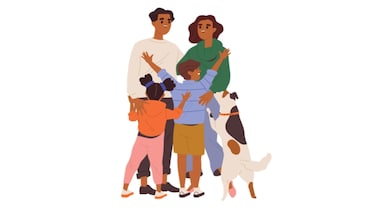- HOME
- /
- Better Living
- /
- Life Skills
- /
What I've Learnt from Reading Obituaries
Recently, I’ve begun using my TikTok account, called Tips from Dead People, to share some life lessons I’ve learned from obituaries. Here are a few favourites.
 illustrations by Gary Hovland
illustrations by Gary Hovland
We Americans are voracious consumers of advice, seeking wisdom wherever we can find it: podcasts, books, TED Talks, life coaches, influencers, religion, therapy, Dear Abby, barbers, bartenders, Uber drivers—the list goes on. I’d like to add my personal source for guidance: obituaries.
It turns out, the dead know a thing or two about living. I’ve been an avid obit reader for decades for the same reason that artist Maira Kalman says she reads them every morning: “Maybe it is a way of trying to figure out, before the day begins, what is important.”
Recently, I’ve begun using my TikTok account, called Tips from Dead People, to share some life lessons I’ve learned from obituaries. Here are a few favourites:
Success is measured in kindness.
Maureen Brennan-Weaver of Harrisburg, Pennsylvania, was accomplished by any standard measure, as a doctor, mother, volunteer. But her obituary comes to life with the tiny details:
“Maureen was 6’0” and loved strays of all species. Could outthink any opponent. Was riotously funny and pathologically generous.” That last part is the key to knowing her. “If you mentioned a thing you liked, she’d get you 11 when she found them at a great price. When a nephew wished for a plastic microscope, she found him a real one (at a great price) and painstakingly prepared hundreds of slides for his study.”
Turns out that qualities like generosity are actually the things that endure, not the job titles or the purchases.
Overcoming obstacles isn’t just for superheroes.
If you think that a catastrophe in your life will define you forever, worry not. I’ve read obituaries of lives that featured disaster, heartache, addiction, estrangement, breakups and all manner of reckless choices. And guess what? In almost every case, there was another chapter, sometimes many more chapters. Renewals, rebirths, remarriages, relocations—it ain’t over till it’s over.
Take Jerry Tubb of Nichols Hills, Oklahoma, who in 1955 and 1956 spent six months in the hospital, losing the use of his legs to polio as a teenager, just months before the vaccine became available. His extraordinarily positive obituary reads:
“You would have thought Jerry would have become needy, pessimistic and maybe even jealous of others over the seven decades his body continued to fail him again and again and again, leaving him both paralyzed and without feeling below his chest in the last years of his life. But he never did. Jerry kept getting up, day after day—and he kept treating each moment of life as a gift.”
Tubb’s story includes law school, an epic love story and so much more. The moral of the story: You may think that you’re defined by catastrophic moments, but don’t ever count yourself out—or anyone else for that matter.
When in doubt, laugh.
Renay Corren of El Paso, Texas, died at the age of 84, a crushing blow to her family. But as the obituary written by her loving son shows, this is a woman who will be remembered for living life to the fullest, consequences be damned:
“The bawdy, fertile, redheaded matriarch of a sprawling Jewish-Mexican-Redneck American family has kicked it. Hers was an itinerant, much-lived life: a Yankee Florida liberal Jewish tough gal who bowled ’em in Japan, rolled ’em in North Carolina and was a singularly unique parent. There will be much mourning in the many glamorous locales she went bankrupt in: McKeesport, Pennsylvania, Renay’s birthplace and where she first fell in love with ham and atheism; Fayetteville and Kill Devil Hills, North Carolina, where Renay’s dreams, credit rating and marriage are all buried. There will be a very disrespectful and totally nondenominational memorial on 10 May 2022, most likely at a bowling alley in Fayetteville. The family requests absolutely zero privacy or propriety. Bye, Mommy. We loved you to bits.”

Not to be outdone is Edna Dubuc of Nashua, New Hampshire. By the end of her life, she suffered from dementia. But in her obituary, Dubuc’s family preferred to highlight the joy she found in life:
“She was the bingo queen. She never met a candy she couldn’t store in her bra for later. She had great teeth until they got lost. She’d flirt with everyone. She laughed so much she often peed her pants. We’ll miss her stories and her sporadic use of French. One thing we know for sure is that wherever she is, there’s country music playing and she’s dancing.”
In the end, people will be remembered not by the disease, but by how much joy they contributed to the world.
Be honest, even when it hurts.
There comes a point in life and in death when we need to be brutally honest about the hard stuff. Take Cody James Holland of Heuvelton, New York. His mom wrote his obituary and led off with a truth bomb like no other:
“Cody James left us on 8 August 2020, as a result of injuries sustained from being a dumb a**. He drank, drove and didn’t wear his seat belt! Please, don’t be a dumb a**!”
The obit generated some controversy, but his mom said she’d do it again to save someone else. Don’t misunderstand: Holland was well loved and relished his life.
“He loved his family and friends, along with trucks, his motorcycle, his dog, his guns, hunting, fishing, steak, chew, beer, hats on sideways, Sour Patch Kids, Swedish Fish and Shania Twain.”
But a tribute to him without the hard stuff wouldn’t be a real tribute. You don’t need to whitewash a person’s life to pay tribute to them. We all contain paradoxes and complications, and not only is there nothing wrong with that, it’s what makes us beautiful.
Try something new.
As a perfectionist, I find that this tip is the hardest, and maybe the most important, for me to implement. Can you imagine realizing at the end of your life that you didn’t try something, simply because you thought you might fail? Suffering from a fear of failure did not apply to Ida Keeling of Harlem, New York. According to her obituary, Keeling was 67 and depressed over the sudden loss of her husband and her two sons, when, at the urging of her daughter, she entered a 5K with only a day’s notice.
“She was all-in and said early into the race that she felt like she was running up and out of a hole, like someone had watered a plant that had not been watered in a long time.”
The spark was lit and she went on to run for three more decades (she died at age 106).
Don’t feel like breaking a sweat? Then be like Ricardo Torres of Wayzata, Minnesota. His obit says, “In recent years he discovered a passion for gardening. He approached it with little planning but lots of enthusiasm, especially when it came to killing weeds. Many a neighbour witnessed Rich using a flamethrower to torch the unwanted plants in his yard. The cigar in his mouth was a nice touch.” Now come on! That’s a guy you’d want as your neighbour.

Reading so many obituaries has of course inspired me to think about what my own might say. “Punctual to a fault”? “Mediocre dancer but expertly sarcastic”? “Her perfect meal was a peanut butter and bacon sandwich”?
Any of these things, as ‘little’ as they are, say more about me than a list of jobs or the money I’ve made. That’s because the little things in life—the things that seem inconsequential but add depth and whimsy and joy to our days—they are what make it so worth being alive.






